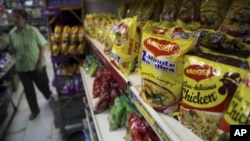The food manufacturer Nestle has removed a product from sale in India because of safety concerns. Tests showed Maggi noodles contained large amounts of the heavy metal, lead.
The first reports of a problem with the product came from a rural town in one of India’s poorest states, Uttar Pradesh. Soon after, the country's food safety agency declared Maggi noodles "unsafe” to eat.
The recall is one of India’s largest food actions. At least six states have banned the product.
The noodles cook in two minutes and are popular among children and students. Nestle sells about $240 million dollars worth of the noodles every year.
Nestle has rejected the test results. It says the product is safe. It has appealed the ban in court. It has asked for an examination of the government’s testing method.
But, India's food safety agency stands by its reports. It says it is now testing several similar foods from seven other manufacturers.
Ashwin Bhadri is head of Equinox Labs in Mumbai. He says the testing of packaged foods is needed. He helps companies comply with food safety regulations.
“This is something that should be happening more regularly, especially for the bigger products which are circulated in the millions."
Several other countries, including Canada and Britain, also have ordered tests on Maggi noodles imported from India.
The food scare has led to mixed reactions. Some Maggi noodle lovers are not persuaded of any danger, like Shweta Andrews. She and her friends still enjoy the food.
"I don't think there is any problem in having Maggi. You have grown up having Maggi, and it does not matter really, you can still have it. In fact I was craving (for) it today."
There are many reports of food contamination in India and a lack of cleanliness in food preparation. Experts say this has led consumers to put more trust in packaged foods made by big companies.
Amit Khurana heads the food safety team at the Center of Science and Environment in New Delhi. He says he hopes consumers and regulators both will study foods more closely now.
He says packaging rules need to be strengthened and consumers need to understand how to read food labels.
“Perhaps there needs to be much more stringent standards of monitoring. So If I have to pick up one thing out of this -- yes, maybe packaged food is not as safe as it appears to be.”
India's food safety agency is just seven years old. Experts say the establishment and enforcement of regulations is poor.
India has experienced such food scares before. In 2006, a New Delhi environmental group raised questions about small amounts of pesticide in Coca Cola and Pepsi drinks. Both companies aggressively denied the claims.
In 2003, chocolate company Cadbury launched a big campaign to win back public trust after reports that worms were found in some chocolate products.
Nestle Chief Executive, Paul Bulcke says he is working with Indian officials to correct the problem. He says the company will win back the trust of consumers.
I’m Marsha James.
Correspondent Anjana Pasricha reported this story from New Delhi. Marsha James adapted it for VOA Learning English. Caty Weaver was the editor.
______________________________________________________
Words in This Story
comply – v. to do what you have been asked or ordered to do
regulation –adj. required by law or rule
contamination – v. to make impure by adding improper ingredients
label – n. a piece of paper, cloth, or similar material that is attached to something to identify or describe it
stringent – adj. very strict or severe





